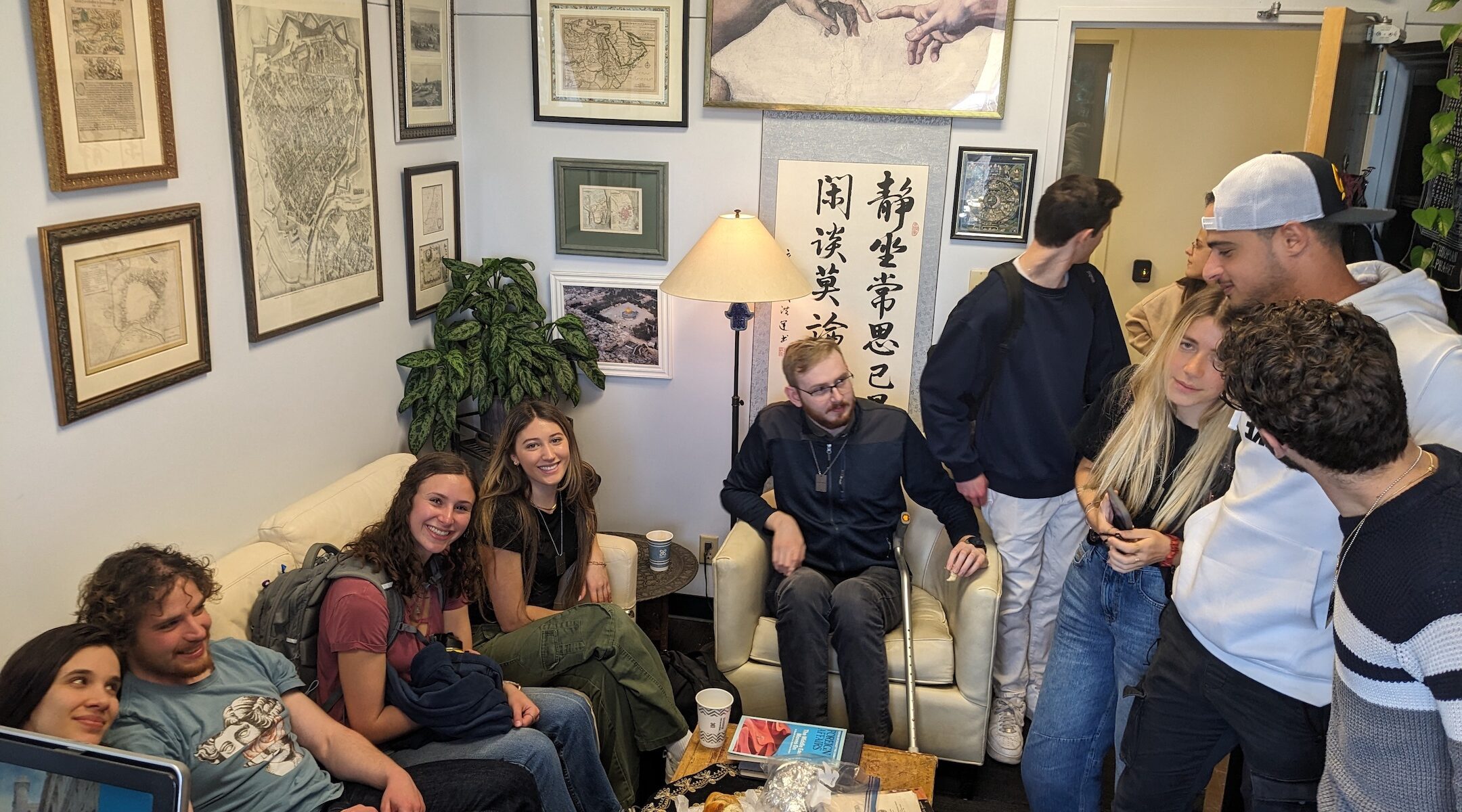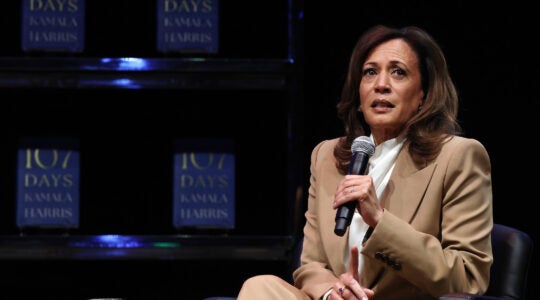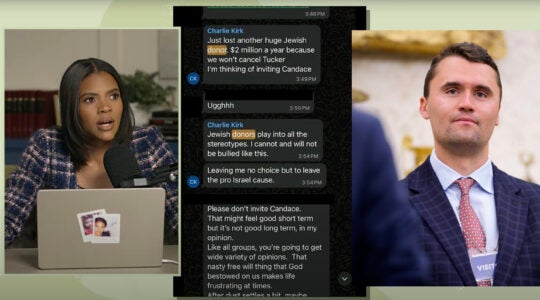(JTA) – Jewish academics protesting campus antisemitism have found a new way to vent their frustrations: Sleep on it.
That’s the idea behind a new “sleep-in” mass protest which Jewish students and faculty across multiple campuses, mostly in California, are launching Tuesday evening. It comes amid increased scrutiny of antisemitism on many campuses and particularly at the University of California, Berkeley — a just-announced congressional investigation will probe what the investigating committee called the Cal Berkeley’s “failure to protect Jewish students.”
The sleep-in is inspired by Ron Hassner, the chair of Israel studies at Berkeley, who has moved into his office indefinitely until the university takes concrete steps to address antisemitism on campus. Hassner and the other protesters hope to inspire Jews to take nonviolent action and pressure administrators to more forthrightly deal with speaker disruptions, campus spaces occupied by pro-Palestinian protesters, and other concerns raised by Jewish students in the midst of the Israel-Hamas war.
Hassner is an inadvertent leader of this movement; he told the Jewish Telegraphic Agency that at first, he did not expect to inspire others to follow his lead.
“I’m very embarrassed by that,” Hassner told JTA. “The kind of enthusiasm with which people treat this as heroism suggests to me that we lack heroes.”
The main trigger for Hassner’s actions, and for the increased scrutiny at Berkeley, was a Feb. 26 protest by pro-Palestinian groups that turned violent. A visiting Israeli speaker’s planned event was shut down and some Jewish students were assaulted. Afraid that a subsequent march by Jewish students directed at a highly visible pro-Palestinian campus protest might escalate into violence, he sought to offer an alternative.
The Jewish students’ march wound up being peaceful, but Hassner says there’s more work to be done. Now on his second week camping out in his office, he has the attention of administrators and says he’s already “seen movement from the university.”
One of his demands was that the university more forcefully police the pro-Palestinian protest at Sather Gate, a central campus gathering place, where Jews on campus say the pro-Palestinian crowd frequently harassed and blocked the paths of Jewish students. That has now turned into a “game of cat-and-mouse with the university where the university takes down their stuff, they put it up again the next day,” Hassner said.
But other demands remain unmet, and Hassner has no immediate plans to pack up his things. On the contrary, he has enlisted students to stage their own sleep-ins at campus Hillel and Chabad houses and has called colleagues at other California campuses — and fielded calls from others across the country — about mobilizing a larger display of solidarity.
“The sleep-in, coming after our march, is a testament to our determination to force the administration’s hand,” Daniel Solomon, a Jewish doctoral student at Berkeley and protest organizer, told JTA in a statement. Solomon also published a piece this week in Tablet magazine accusing the Berkeley administration of having “done nothing to halt continued harassment and intimidation on the campus.”
Neither Hassner nor the student organizers provided an estimated count of the sleep-in’s participants, saying that they were waiting to see how many pledges would turn into real commitments. But they named several campuses where they expected students and/or faculty to participate, including UC San Francisco; Stanford University; San Francisco State University; and the Lawrence Berkeley Laboratory, which is run by the University of California.
Another participant will be Jeff Kopstein, director of UC Irvine’s Center for Jewish Studies and a friend of Hassner’s. Kopstein told JTA his sleep-in would be for two nights only: “I’m 62. I’m not sure how long my back will last on an air mattress. Especially one of these ones that I just got on Amazon.”
Kopstein said he believed the environment for Jewish students at UC Irvine is not as bad as that on other campuses such as Berkeley. But that comes with a big asterisk: After protesters disrupted a November talk on the Israel-Hamas war by visiting Israeli professor Alon Burstein, the Jewish studies department decided not to schedule any more Israel-related events and hasn’t held any since.
“It was a very objective, you might even say almost pro-Palestinian talk,” Kopstein said of Burstein’s remarks. “They didn’t really care about what he said. They were there to disrupt, so they disrupted it, and nobody has been yet held accountable for that at all.”
None of the Jewish studies programming the center has embarked on since then has involved Israel, and the center has still maintained a police presence, even for Holocaust-related or Yiddish poetry events.
“I don’t want to have disrupted events,” Kopstein said. But the cost of trying to keep campus temperatures down, he said, is that “in essence I’m not able, as the director of the Center for Jewish Studies, to fully do my job.”
Kopstein is providing his chancellor with his own list of “requests” similar to Hassner’s, which include enforcing university rules prohibiting the disruption of campus events; re-inviting any speakers whose talks have been shut down; and instituting mandatory antisemitism and Islamophobia training for staff. He declined to comment on the university’s response to his requests.
As the sleep-in was preparing to go live Tuesday, the U.S. House Committee on Education and the Workforce, which has already launched a handful of investigations into prominent universities’ handling of campus antisemitism, announced it was also opening a probe into Berkeley.
The letter from Republican Rep. Virginia Foxx, the committee’s chair, requests an extensive series of documents from the university regarding its handling of recent reported incidents of antisemitism. It cites a number of events dating back years, and asks for information on Jewish Studies faculty and staff hiring. But it specifically cites the events of Feb. 26, which have also prompted a criminal investigation and a Title VI discrimination investigation by the Department of Education.
“We have grave concerns regarding the inadequacy of UC Berkeley’s response to antisemitism on its campus,” Foxx wrote to the school’s chancellor, president and Board of Regents chair.
The chancellor, Carol Christ, also this week conducted an interview with the Jewish News of Northern California in which she declined to say whether she thought antisemitism was a serious problem on Berkeley’s campus.
“I think that there are problems with lots of different kinds of prejudices,” Christ said. “On the Berkeley campus, I hear from Black students that they feel that they’re victims of prejudice. I hear from Muslim students that they feel they’re victims of prejudice. We live in a world in which there is a lot of prejudice and bigotry. Asian students often talk to me about the prejudice that they feel.”
Christ continued, “So I don’t think antisemitism is unique in the kind of bigotry that students suffer. What is different about it is this national narrative that’s gotten attached to it. That really complicates the situation in a way that’s quite different from some of our other groups.”
JTA has documented Jewish history in real-time for over a century. Keep our journalism strong by joining us in supporting independent, award-winning reporting.






